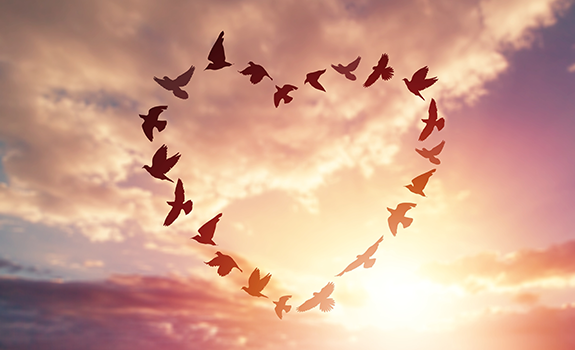January 17, 2023
There is Love All Around

By Valerie Driscoll, Lead Coach and Coaching Program Developer for Apollo Health
My Father fell in love with my Mother at first sight, in a bowling alley, in 1955. Mom was an RN, and dad was a championship bowler and the owner of the bowling alley. He was the opposite of everything my grandparents wanted for my mother, i.e., a doctor, but after their first conversation, it was a done deal, even though mom was a terrible bowler.
Dating was a glamorous activity in the 50s, and my parents went to Manhattan often for dinner and a show. Their favorite song, “ ’Til There Was You,” was from their favorite show, The Music Man. My best childhood memories include my Father and Mother singing the lyrics to one another:
There were bells on a hill
But I never heard them ringing
No, I never heard them at all
‘Til there was you
There were birds in the sky
But I never saw them winging
No, I never saw them at all
’Til there was you
There was love all around.
But I never heard it singing.
No, I never heard it at all
’Til there was you
It was true for them; they meant every word.
My Father’s vascular dementia began around age 65, and he lived another 13 years, progressing from slightly confused to bed-bound. Because of what I do, I often think about what could have been possible if I(or anyone) had known then what is known now. It is a huge part of why I do this work.
Today, however, as I was working with a client, I thought of mom in her role as a caregiver and how much more help I could have been to her, as well.
In my session with the caregiver, a wife who wants desperately to heal and care for her husband, I traveled back 20 years. My client’s passion felt so familiar, as was sensing the crumbling around the edges despite her steadfastness that everything was fine; she was fine.
Nursing so well suited my Mom’s natural gifts of compassion, kindness, keen deductive reasoning, and gut instinct. As an RN and then school nurse, she truly treated every patient and child like her own. She nursed everyone: patients, friends, parents, in-laws, siblings, and finally, the love of her life.
During most of the 10+ years that my Mother cared for my Father, she equated self-care or enjoyment with abandoning him and any uttering of how unbelievably difficult or tragic it might have been as complaining and betrayal. In her mindset, it was failing as a nurse, but more importantly, as a wife. Any self-care sacrificed time and energy caring for my Dad. And she, like my client, was always “fine.”
It took years and much cajoling and pleading for her to begin to accept that self-care might also be a way of caring for my father and that admitting that things were “not fine” was not tantamount to failure but a way to let others help her. It was glacial, but mom realized that as she decompressed, so did everything and everyone else. She came home from shorter or longer adventures with stories to share with my Father; even as his ability to communicate lessened, he would still smile and laugh along with her. It was achingly bittersweet, but it gave them a new connection. More importantly, it gave my Mother the respite she was unaware she needed.
Today, I asked my client what some of her favorite activities had been with her husband; she told me about doubles tennis, cycling through the park near their home, and playing bridge. These had all been forgotten since her husband had lost interest in them. It made her sad to do them without him. Together we acknowledged how difficult this was and allowed time for some self-compassion. Then, we explored ideas for approaching these activities with new perspectives. We also talked about things she loves but in which he never had any interest — line dancing and the theater jumped to the top of the list! While there may not be perfection in any of these solutions, there is possibility. I could feel her become lighter as we planned how to put some of these ideas into action.
When caring for a loved one with cognitive decline, it is so easy to focus so much love in their direction and forget that there is still love all around. I know that the bells, the birds, and the music were never the same mom as they were when dad was well, but there was still so much life to enjoy. If she had been able to see it sooner, it would have made such a difference to both her physical and mental health.
When my father passed away, every widower in their complex courted her, which she found both troublesome and hilarious, and to which she commented, “not a chance”; she was through nursing, and after all, there had been only one guy for her.




